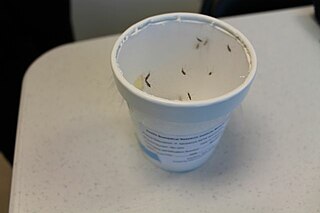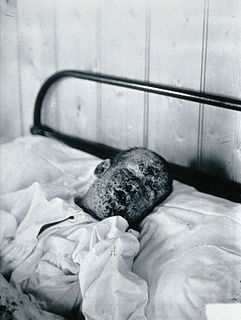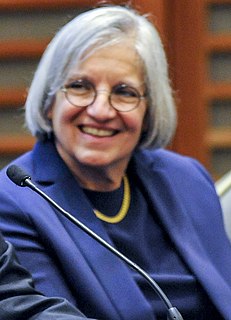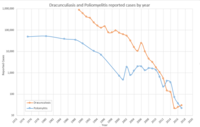Related Research Articles

Malaria is a mosquito-borne infectious disease that affects humans and other animals. Malaria causes symptoms that typically include fever, tiredness, vomiting, and headaches. In severe cases, it can cause jaundice, seizures, coma, or death. Symptoms usually begin ten to fifteen days after being bitten by an infected mosquito. If not properly treated, people may have recurrences of the disease months later. In those who have recently survived an infection, reinfection usually causes milder symptoms. This partial resistance disappears over months to years if the person has no continuing exposure to malaria.
Tropical diseases are diseases that are prevalent in or unique to tropical and subtropical regions. The diseases are less prevalent in temperate climates, due in part to the occurrence of a cold season, which controls the insect population by forcing hibernation. However, many were present in northern Europe and northern America in the 17th and 18th centuries before modern understanding of disease causation. The initial impetus for tropical medicine was to protect the health of colonial settlers, notably in India under the British Raj. Insects such as mosquitoes and flies are by far the most common disease carrier, or vector. These insects may carry a parasite, bacterium or virus that is infectious to humans and animals. Most often disease is transmitted by an insect bite, which causes transmission of the infectious agent through subcutaneous blood exchange. Vaccines are not available for most of the diseases listed here, and many do not have cures.

Tropical medicine is an interdisciplinary branch of medicine that deals with health issues that occur uniquely, are more widespread, or are more difficult to control in tropical and subtropical regions.

Neglected tropical diseases (NTDs) are a diverse group of tropical infections that are common in low-income populations in developing regions of Africa, Asia, and the Americas. They are caused by a variety of pathogens, such as viruses, bacteria, protozoa and parasitic worms (helminths). These diseases are contrasted with the "big three" infectious diseases, which generally receive greater treatment and research funding. In sub-Saharan Africa, the effect of neglected tropical diseases as a group is comparable to that of malaria and tuberculosis. NTD co-infection can also make HIV/AIDS and tuberculosis more deadly.

The Swiss Tropical and Public Health Institute or Swiss TPH is an international public health institute working in various disciplines with a particular focus on low- and middle-income countries. It was founded in 1943 through the initiative of Rudolf Geigy. Swiss TPH endeavors to the improve the health of populations internationally and nationally through research, services, education, and training, with a focus on developing countries.

A malaria vaccine is a vaccine that is used to prevent malaria. The only approved use of a vaccine outside the EU, as of 2022, is RTS,S, known by the brand name Mosquirix. In October 2021, the WHO for the first time recommended the large-scale use of a malaria vaccine for children living in areas with moderate-to-high malaria transmission. Four injections are required for full protection.

Eradication is the reduction of an infectious disease's prevalence in the global host population to zero.

Mirta Roses Periago is an Argentine epidemiologist who served as Director of the Pan American Health Organization (PAHO) from 2003 until 2013.
Medicines for Malaria Venture (MMV), a not-for-profit public-private partnership, was established as a foundation in Switzerland in 1999. Its mission is to reduce the burden of malaria in disease-endemic countries by discovering, developing and facilitating delivery of new, effective and affordable antimalarial drugs. Its vision is a world in which these innovative medicines will cure and protect the vulnerable and under-served populations at risk of malaria, and help to ultimately eradicate this terrible disease.

Muhammad Ali Pate is a Nigerian physician and politician who is currently Professor of the Practice of Public Health Leadership in the Department of Global Health and Population at Harvard University, formerly served as the Global Director for Health, Nutrition and Population at the World Bank Group and Director of the Global Financing Facility for Women, Children and Adolescents (GFF). Pate is also the former Minister of State for Health in Nigeria.
Chetan Eknath Chitnis is an Indian scientist in the field of malaria research. He is the head of the Malaria Parasite Biology and Vaccines Unit at the Institut Pasteur in Paris and an elected fellow of the Indian Academy of Sciences (2009) as well as Indian National Science Academy (2014). He received the Shanti Swaroop Bhatnagar Award in 2004 and the Infosys Prize in Life Sciences 2010. Chitnis is the former Principal Investigator of the malaria research group at the International Centre for Genetic Engineering and Biotechnology (ICGEB) in New Delhi.
Mundo Sano, or Fundación Mundo Sano, is a scientific, nongovernmental foundation in Argentina working for the prevention and control of communicable diseases such as dengue fever, Chagas disease, malaria, leishmaniasis and soil-transmitted helminthiasis. Its main objective is to facilitate equal access to health and welfare among people who are vulnerable to these otherwise avoidable diseases, mainly by promoting strategic policies for the improvement of the quality of life of affected communities.
This page is a timeline of global health, including major conferences, interventions, cures, and crises.

Dyann F. Wirth is an American immunologist. She is currently the Richard Pearson Strong Professor of Infectious Diseases at Harvard T.H. Chan School of Public Health.
Pedro L. Alonso, is a physician, epidemiologist, and researcher in diseases that affect vulnerable populations. Based on a multidisciplinary approach, his work focuses mainly on malaria, although he has also studied other infectious diseases. He served as the Director of the Global Malaria Programme at the World Health Organization between 2014 and 2022, and is currently Professor of Global Health at the Faculty of Medicine and Health Science-Hospital Clinic, at the University of Barcelona.
Francine NtoumiPh.D., HDR, PvDz, FRCPedin is a Congolese parasitologist specializing in malaria. She was the first African person in charge of the secretariat of the Multilateral Initiative on Malaria (2006-2010). In recent years, she has become involved in research on other infectious diseases.

Oriol Mitjà i Villar is a Catalan-born Spanish researcher and consultant physician in internal medicine and infectious diseases with expertise in poverty-related tropical diseases. He has conducted research at the Lihir Medical Centre in Papua New Guinea since 2010 on new diagnostic and therapeutic tools to eradicate yaws. He was awarded the Princess of Girona Award in the scientific research category. Currently at the Germans Trias i Pujol Research Institute, Mitjà is conducting research on SARS-CoV-2 coronavirus disease (COVID-19) and strategies to control the infection at a community level.
Silvie Huijben is an evolutionary biologist and Assistant Professor at Arizona State University. The Huijben Lab uses fieldwork, lab experiments, and mathematical modeling to study antimalarial and insecticide resistance in parasites, such as disease-transmitting mosquitoes. Her work is focused on applying evolutionary theory to produce resistance management strategies to best combat malaria.
Rose Gana Fomban Leke is a Cameroonian malariologist and Emeritus Professor of Immunology and Parasitology at the University of Yaounde I.
Marta Tufet Bayona is a British and Spanish biologist and public health resource coordinator with a specialty in malaria. She is Executive Director of the UK Collaborative on Development Research.
References
- ↑ "The Malaria Eradication Research Agenda (malERA) initiative" (PDF). WHO International. Retrieved 10 January 2016.
- ↑ "MalERA-A Research Agenda for Malaria Education". PLoS Magazine. Retrieved 10 January 2016.
- 1 2 3 "Scientific Alliance for Malaria Eradication". ISGlobal. Retrieved 3 January 2016.
- ↑ "MESA Steering Committee". ISGlobal. Retrieved 10 January 2016.
- ↑ "Governance". Manta Ray Media. Retrieved 3 January 2017.
- ↑ "MESA Track". Malaria Eradication Scientific Alliance. Retrieved 10 January 2017.
- ↑ "Grants". Malaria Eradication Scientific Alliance. Retrieved 3 January 2017.
- ↑ "malERA Refresh: Updating the Malaria Eradication Research Agenda". Manta Ray Media. 1 Nov 2016. Retrieved 3 January 2017.
- ↑ "The People's Republic of China". Manta Ray Media. Retrieved 3 January 2017.
